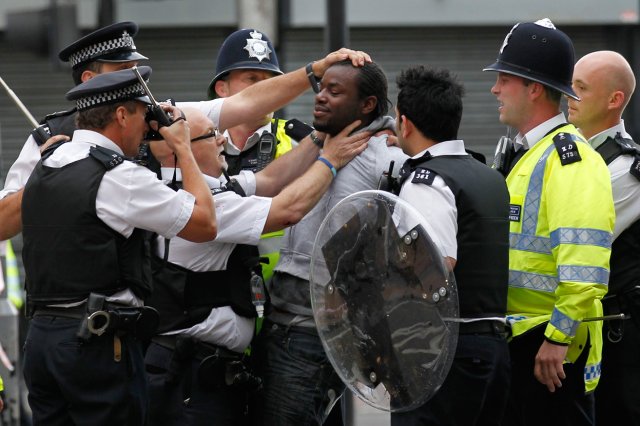
After the riots in Britain, magistrates were advised to “disregard normal sentencing” when examining the cases of people involved. The result of this is a rapid rate of convictions and a complete lack of proportion between the crimes committed and the sentences delivered.
For example, a 23-year-old engineering student received six months in prison for stealing bottled water during the riots. A 20-year-old was sentenced to four years in jail for setting up a “riot-inciting” Facebook event that only he, and the police, actually showed up to.
Another 22-year-old man received four years’ jail for adding a Facebook event called “The Warrington Riots”. He was jailed even though he removed the page the next day and apologised for the joke.
There has been a rising backlash against these sentences. Even conservative commentators described them as “showtrials”, orchestrated purely to try to “send a message” to young people.
Likewise, British Prime Minister David Cameron’s calls for “getting [the police] out on the streets where people can see them and criminals can fear them” are cause for serious concern.
But what is the logic behind such clearly disproportionate sentencing and police-state rhetoric?
The fact is the situation following the riots has been dealt with as one of “exceptional circumstances”. Italian political philosopher Giorgio Agamben theorised that a “state of exception” is one in which the state claims the power to extend its authority beyond the normal rule of law.
In a predictable but nonetheless potent move, Cameron said Britain’s state of exception in this case as a “slow-motion moral collapse”.
In his so-called fightback speech on August 15, Cameron assured the public the riots were not about poverty, race or government cuts.
Instead, they had everything to do with bad “behaviour” and “twisted moral codes”.
Within this framework, Cameron hauled out a line of problems that need mending. The first is, of course, single mothers. Cameron said he doesn’t “doubt that many of the rioters … have no father at home”.
According to Cameron, without a strong male role model, one is bound to be a rioter. The next target for blame was schools, where discipline has supposedly flown out the window and children who are repeatedly failing are allowed to get away with it.
After this was welfare, where “for years” there has been a system “that incites laziness, that excuses bad behaviour, that erodes self-discipline, that discourages hard work”, Cameron said.

The final major point Cameron made, without explaining exactly what he meant, was that a culture of twisting of health and safety and human rights had “undermined personal responsibility”.
Cameron’s message of class loathing was an unimaginative but immensely effective collection of scapegoats. Listed were children without fathers, schools without discipline, reward without effort and a “culture of human rights”.
Beneath the rhetoric, Cameron’s notion of a “slow-motion moral collapse” in Britain is an example of liberal relativism.
In this outlook, the economy is not to blame, the obscene gap between rich and poor is not to blame and the corrupt media are not to blame. Instead, the culprit is Britain’s culture of “moral neutrality” where “‘live and let live’ becomes ‘do as you please’”.
Therefore, the British riots are supposedly a result of the fact that many British youths no longer believe they are, in Cameron’s words, “the architects of their own problems”, but instead think “they are victims of circumstance”.
However, it is necessary to point out that these are not really explanations. Cameron’s phrase “pure criminality” sums it up.
The reason it is “pure” is because it is without real cause. Cameron implies that the young people who took part in the riots are essentially bad, and needed to have this evil beaten out of them as children.
There is no “cause” for this inherent evil. And therein lies the power of this rhetoric, precisely because it is without cause, all critical thinking about it is suspended.
The fact that these riots could be an inarticulate expression, or at least a symptom, of oppressive economic and political structures is simply out of the question.
Within this vacuum of critical thinking, any number of scapegoats can be put on trial, and, by garnering the support from the population, increase the dominance of corporate powers over the working class.
This connection of moralist rhetoric and a “state of exception” is not a new tactic. The repeated use of the term “evil” in former US president George W Bush’s speeches after the September 11 terror attacks was clearly meant to lend weight to the exceptional measures (which Bush first called “infinite justice” — perhaps a response to “pure criminality”?) the US government undertook.
These included multiple wars with no justification, the illegal detention of prisoners at Guantanamo Bay and other facilities and huge attacks on civil liberties within the US.
Likewise, the hysteria about “queue jumpers” and “people smugglers” in Australia allows for normal legal procedures and international obligations to be suspended without the Australian population rising up against it.
In another expression of this logic, many progressive criticisms of contemporary parliamentary democracy and corporate domination are shot down with the label “totalitarian”. The figures of Stalin and Hitler are used to prevent any serious debate or genuine comprehension of the historical or political problems society faces.
Not to mention the accusation of fascism climate change deniers fling at those who call for a regulation of the markets to help save the planet from global warming.
Cameron’s response to these riots is just the latest in this list. Summed up, the message is: “This is an exceptional circumstance that requires exceptional measures” and, “this exceptional circumstance has no real cause except immorality itself, so don’t question our response”.
As Judge Elgan Edwards, QC, passed the four-year sentence for the 20-year-old who made a Facebook event, she described it as an “evil act”.
Comments
Anonymous replied on Permalink
Anonymous replied on Permalink